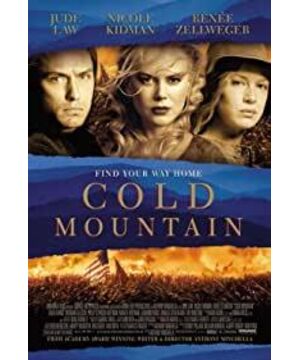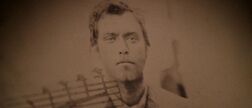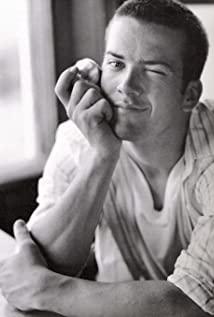Thousands of miles without a rooster. Life and people are left with one hundred, and the thought of it will break the human gut. - Cao Cao's "Haoli Xing" History is the life of the dead rebuilt by the living and for the living. --Raymond Aron (France), Philosophy of History Perhaps because of the same director Anthony Minghella, when I watched "Cold Mountain", I kept thinking about the plot of "The English Patient" (1996), in which war, love, and fate were intertwined. I had to watch the movie in the conflict between my memories and my eyes, and it was inevitable to lose sight of the other. If the love story between Emmache and Catherine in "The English Patient" runs through the main line of the whole film, and is placed in the grand background of World War II, then the love between Inman and Ada in "Cold Mountain", as A seemingly absent line partially outlines the historical picture of the American Civil War. It is worth noting that "Cold Mountain" inherits the narrative style of "Ying" to a certain extent, but replaces the interlacing of memory and reality in "Ying" with the interlacing of the hero and heroine's behavior and language, and ultimately both narratives. The moment when the two meet each other reaches the climax of the film, giving the viewer a complex and inexplicable emotional experience. As for what history is, although the film itself does not give a clear answer, it at least allows us to understand - history, especially the history of war, the pain it brings to human beings and the unevenness and soul movement behind the pain. In fact, it can be found that the excavation and handling of the sensitive history of the Civil War in "Cold Mountain" is based on a relatively neutral attitude; Judges analyze, evaluate and criticize the Civil War, but based on a calm, rational and humane consideration, they try to dispel the justice and victory or defeat of either side between the North and the South. In many cases, the so-called justice is nothing but the victor’s self-promotion and political glorification, and it is most likely to belong to the side that competes for the right to speak in history, that is, the so-called winner; however, victory is not necessarily de facto justice. Victory and defeat seem ridiculous and naive in the face of the huge blood cost and heartache, and behind them are endless pain and thankless consolation. This point can be seen in many places in the movie: several federal soldiers (Northern Army) bully and deprive a mother and child in order to obtain food, and the leader even rapes the grieving widow and cruelly treats the sick baby. They were thrown on the cold ground; the Confederate Army (Southern Army), in the name of tracking down deserters, tried to squeeze the people. It is only a tester and a mirror of human nature, and it is also a test. It uses its unique tyranny, brutality, and bloody battles to test the strength of the victims' survivability and the strength of their spiritual support. Of course, people often appear extremely vulnerable and insignificant in the face of war, just as A line in the movie: "Not only did the army retreat on the battlefield, but those who stayed behind were also losing the war." Forget about the psychological conflicts of the soldiers on the battlefield where the corpses were littered with corpses, take the heroine Ada as an example. The sudden death of the only dependent father, and the desolation and decline brought about by the war, undoubtedly caused huge obstacles to life and mental pain for this lonely woman. At first, Ada's self-esteem made her ashamed to accept "alms", and she lacked the ability to live independently, which always made people feel a little sad for Ada's immaturity; therefore, Ada's transformation, maturity and even transformation still need a lot of Conditions: First of all, her vague and hazy love for Inman and her persistence have become her most important spiritual pillars, and her endless thoughts and worries have turned into 103 letters full of sincere emotions; With help and guidance, he gradually learned to be independent and self-sufficient, and rekindled his confidence in life and the desire to rebuild his homeland. If Inman's long and arduous trek is seen as an "Odyssey"-style quest for home and a longing for reunion, then Ada's inner struggle and the process of enduring loneliness and finding happiness are the times when human beings face major disasters. A footnote to the immortality of the spirit; it also illustrates a timeless and very original theme, chanting the eternal affection of countless women: waiting. The love between Inman and Ada is both extremely subtle and heart-wrenching. This originated from the unexpected encounter at the construction site, but just as the two were about to develop their love further, the gunfire in South Carolina pulled them mercilessly into the whirlpool of war, destroying the girl's plate (or playing the piano in a long way), the simple and beautiful picture of the young man farming in the field, and the two have been separated for several years since then. In fact, the film has already begun to depict the picture of war. Even if there is no interlude in the beginning of the northern army detonating explosives, the stories before the war also hint that the shadow of war is about to shroud the south. Ada hates war, and Inman is not a fanatical warfighter, but he has no choice but to join the army, even if his political beliefs do not belong to the Confederacy (nor the North, which is trying to abolish slavery, Inman's politics The stance is not very clear, as can be seen from his conversation with Ada's father and the blissful face at the moment when the news of the war came); It was very sad to leave, as if she saw the beginning of the tragedy; however, the tragedy was not caused by the battlefield, or even by the enemy (Northern Army), but directly by the crime of the home guard, which can be described as a great irony. The two young people's maintenance of the moments of love (the moments of shy communication, especially the moments of hugging and kissing when parting) are pinned on a photo of each, and Ada's gift to Ying. In the book of William Bartom's travels, Ada never forgets Inman and inspires him to live. Inman imagines a moment as "thousands of moments, like a bag of tiny diamonds", so it can be said that war It did not destroy the hope that the two of them depended to survive. The handling of film details is particularly important, Ada's sentence "I'm not smiling in the photo", and Inman's shock and awakening from the blurring of serious injuries by Ada's letter "It's my request to come back to me", It allows us to see the power of love from a delicate perspective. Even if this love lacks nutrients and is not as profound as eachother, it still resonates with us as a power similar to faith. The ending of the film is also just right in the details. The most impressive thing is the use of hallucinations: when Ada sees Inman staggering from the snowy valley, accompanied by a crow, in the inverted portrait of Sally's well water. At the time, she was afraid that this was the scene of Inman's death; the inconsistency of the scene when the two met was a great comfort to Ada, because Inman was alive, but weak because of his serious injuries, but this was a good thing to give. The audience's suggestion - the ending is not so simple, fantasy will eventually become reality; yes, Inman was shot, the gun resounded through the valley, the crow was frightened, in the snow road, he staggered and fell slowly... We I have to mention the hometown guards represented by Teague in the film, but the starting point is not their bullying and shamelessness, but their choice. In front of the helpless and weak civilians, in the case of the embarrassed deserters and their families, do they really have no choice? Obviously, not having a choice is pure fallacy. Many times, the perpetrators act in the name of so-called official decency. Even if you stand in the position of the powerless and make some humane changes, trade-offs and compromises, and even if you do nothing, you must not use this to oppress and slaughter the weak and become a firm supporter of those in power (in the political sense, power is The bachelor at the level, or the masses? The masters of history?). In the final analysis, it is a question of power, how to check the abuse of power by those in power, just like the relationship between government and citizens, public power and individuals. Of course, there are interests behind power, and more than once in the film, it is mentioned that the land near Cold Mountain is the property of the ancestors of the Teague family. The ending of the story, although Inman's tragic death and the ending of his life with the phrase "I'm back" (which echoes the line in Ida's letter asking him to come back), is unavoidably poignant and sighing, but it is not. The purpose of the filmmaker is not the meaning of the film itself. While remembering the pain and cherishing the deceased, do human beings still have enough courage to learn lessons, rebuild their homes, and cherish peace? (often heals physical wounds Easy, soothing the wounds of the soul is extremely difficult) Yes, the characters in the film did it, just as Ada "saw the dark clouds in the well, the dark clouds were pushed aside, and the sunshine was seen", pushing away the haze of war and driving away In the nightmare filled with blood and gunpowder, what people see is the ray of hope, and what people gain is the belief in survival, tolerance and optimism. It reminds me of the fire of hope that Scarlett standing on the steps at the end of the movie Gone with the Wind (1939) ignites from the abyss of despair. Any war needs human beings to reflect, the victors need to bow their heads, and the losers need to restart the door of the soul. Only by abandoning the identity of the victors or losers can we take the first step of learning the lessons of history. "Cold Mountain" provides us with such an opportunity to think about how we should treat history and how to educate future generations (especially those who have never experienced war) and cultivate a correct history view? In what way should history be "written" ("writing" is the act of presenting history in any form)? At the beginning of the article, I quoted the French philosopher Raymond Aron to remind us that we should always be vigilant and aware of the problem of "rebuilding" history and how to "rebuild". The American Civil War is not only a victory for the North, not only an important turning point in the political economy of the United States, but also a national pain: "Now in the United States, it is impossible for anyone to show off the victory of the North Army, whether it is the South or the In the North, they all believed that this killing among compatriots was a tragedy in American history, and this is the basic consensus of the United States on the issue of 'civil war' today. 81) It can be said that the reflection of the United States on the only civil war on its soil is sincere and profound. Whether it is commemorating mourning or daily activities, there is a spirit of reflection everywhere, which cuts into the heart of the entire nation. . In contrast, our reflection on the civil war is minimal, whether it is the emphasis and guidance of compulsory education in this aspect, or the intentional or unintentional historical education-oriented work of the media, film and television, it is far from enough; taking the war of liberation as an example, it is like garbage. Inferior books and film and television dramas based on this theme emerge in an endless stream, and the problems such as the content loopholes, the shoddy plots, and the extremely lack of historical knowledge are like chronic poisons. (The scope and extent of this damage and ignorance of the people are not limited to the present, and more than a generation), so the actual form of history education is contrary to what it should be, as if two unrelated trains run away from each other. ,Lopsided…… It is very difficult to comfort the wounds of the soul) Yes, the characters in the film did it, just as Ada "saw the dark clouds in the well, the dark clouds were pushed aside, and the sunshine was seen", cleared away the haze of war, and drove away the permeating clouds. In the nightmare of blood and gunpowder smoke, what people see is the ray of hope, and what people gain is the belief in survival, tolerance and optimism. It reminds me of the fire of hope that Scarlett standing on the steps at the end of the movie Gone with the Wind (1939) ignites from the abyss of despair. Any war needs human beings to reflect, the victors need to bow their heads, and the losers need to restart the door of the soul. Only by abandoning the identity of the victors or losers can we take the first step of learning the lessons of history. "Cold Mountain" provides us with such an opportunity to think about how we should treat history and how to educate future generations (especially those who have never experienced war) and cultivate a correct history view? In what way should history be "written" ("writing" is the act of presenting history in any form)? At the beginning of the article, I quoted the French philosopher Raymond Aron to remind us that we should always be vigilant and aware of the problem of "rebuilding" history and how to "rebuild". The American Civil War is not only a victory for the North, not only an important turning point in the political economy of the United States, but also a national pain: "Now in the United States, it is impossible for anyone to show off the victory of the North Army, whether it is the South or the In the North, they all believed that this killing among compatriots was a tragedy in American history, and this is the basic consensus of the United States on the issue of 'civil war' today. 81) It can be said that the reflection of the United States on the only civil war on its soil is sincere and profound. Whether it is commemorating mourning or daily activities, there is a spirit of reflection everywhere, which cuts into the heart of the entire nation. . In contrast, our reflection on the civil war is minimal, whether it is the emphasis and guidance of compulsory education in this aspect, or the intentional or unintentional historical education-oriented work of the media, film and television, it is far from enough; taking the war of liberation as an example, it is like garbage. Inferior books and film and television dramas based on this theme emerge in an endless stream, and the problems such as the content loopholes, the shoddy plots, and the extremely lack of historical knowledge are like chronic poisons. (The scope and extent of this damage and ignorance of the people are not limited to the present, and more than a generation), so the actual form of history education is contrary to what it should be, as if two unrelated trains run away from each other. ,Lopsided…… It is very difficult to comfort the wounds of the soul) Yes, the characters in the film did it, just as Ada "saw the dark clouds in the well, the dark clouds were pushed aside, and the sunshine was seen", cleared away the haze of war, and drove away the permeating clouds. In the nightmare of blood and gunpowder smoke, what people see is the ray of hope, and what people gain is the belief in survival, tolerance and optimism. It reminds me of the fire of hope that Scarlett standing on the steps at the end of the movie Gone with the Wind (1939) ignites from the abyss of despair. Any war needs human beings to reflect, the victors need to bow their heads, and the losers need to restart the door of the soul. Only by abandoning the identity of the victors or losers can we take the first step of learning the lessons of history. "Cold Mountain" provides us with such an opportunity to think about how we should treat history and how to educate future generations (especially those who have never experienced war) and cultivate a correct history view? In what way should history be "written" ("writing" is the act of presenting history in any form)? At the beginning of the article, I quoted the French philosopher Raymond Aron to remind us that we should always be vigilant and aware of the problem of "rebuilding" history and how to "rebuild". The American Civil War is not only a victory for the North, not only an important turning point in the political economy of the United States, but also a national pain: "Now in the United States, it is impossible for anyone to show off the victory of the North Army, whether it is the South or the In the North, they all believed that this killing among compatriots was a tragedy in American history, and this is the basic consensus of the United States on the issue of 'civil war' today. 81) It can be said that the reflection of the United States on the only civil war on its soil is sincere and profound. Whether it is commemorating mourning or daily activities, there is a spirit of reflection everywhere, which cuts into the heart of the entire nation. . In contrast, our reflection on the civil war is minimal, whether it is the emphasis and guidance of compulsory education in this aspect, or the intentional or unintentional historical education-oriented work of the media, film and television, it is far from enough; taking the war of liberation as an example, it is like garbage. Inferior books and film and television dramas based on this theme emerge in an endless stream, and the problems such as the content loopholes, the shoddy plots, and the extremely lack of historical knowledge are like chronic poisons. (The scope and extent of this damage and ignorance of the people are not limited to the present, and more than a generation), so the actual form of history education is contrary to what it should be, as if two unrelated trains run away from each other. ,Lopsided…… But it was extremely difficult) Yes, the characters in the film did it, just as Ada "saw the dark clouds in the well, and the dark clouds were lifted, and the sun was seen", to clear the haze of war, and drive away the blood and smoke of gunpowder. Nightmare, what people see is the ray of hope, and what they get is the belief in survival, tolerance and optimism. It reminds me of the fire of hope that Scarlett standing on the steps at the end of the movie Gone with the Wind (1939) ignites from the abyss of despair. Any war needs human beings to reflect, the victors need to bow their heads, and the losers need to restart the door of the soul. Only by abandoning the identity of the victors or losers can we take the first step of learning the lessons of history. "Cold Mountain" provides us with such an opportunity to think about how we should treat history and how to educate future generations (especially those who have never experienced war) and cultivate a correct history view? In what way should history be "written" ("writing" is the act of presenting history in any form)? At the beginning of the article, I quoted the French philosopher Raymond Aron to remind us that we should always be vigilant and aware of the problem of "rebuilding" history and how to "rebuild". The American Civil War is not only a victory for the North, not only an important turning point in the political economy of the United States, but also a national pain: "Now in the United States, it is impossible for anyone to show off the victory of the North Army, whether it is the South or the In the North, they all believed that this killing among compatriots was a tragedy in American history, and this is the basic consensus of the United States on the issue of 'civil war' today. 81) It can be said that the reflection of the United States on the only civil war on its soil is sincere and profound. Whether it is commemorating mourning or daily activities, there is a spirit of reflection everywhere, which cuts into the heart of the entire nation. . In contrast, our reflection on the civil war is minimal, whether it is the emphasis and guidance of compulsory education in this aspect, or the intentional or unintentional historical education-oriented work of the media, film and television, it is far from enough; taking the war of liberation as an example, it is like garbage. Inferior books and film and television dramas based on this theme emerge in an endless stream, and the problems such as the content loopholes, the shoddy plots, and the extremely lack of historical knowledge are like chronic poisons. (The scope and extent of this damage and ignorance of the people are not limited to the present, and more than a generation), so the actual form of history education is contrary to what it should be, as if two unrelated trains run away from each other. ,Lopsided…… But it was extremely difficult) Yes, the characters in the film did it, just as Ada "saw the dark clouds in the well, and the dark clouds were lifted, and the sun was seen", to clear the haze of war, and drive away the blood and smoke of gunpowder. Nightmare, what people see is the ray of hope, and what they get is the belief in survival, tolerance and optimism. It reminds me of the fire of hope that Scarlett standing on the steps at the end of the movie Gone with the Wind (1939) ignites from the abyss of despair. Any war needs human beings to reflect, the victors need to bow their heads, and the losers need to restart the door of the soul. Only by abandoning the identity of the victors or losers can we take the first step of learning the lessons of history. "Cold Mountain" provides us with such an opportunity to think about how we should treat history and how to educate future generations (especially those who have never experienced war) and cultivate a correct history view? In what way should history be "written" ("writing" is the act of presenting history in any form)? At the beginning of the article, I quoted the French philosopher Raymond Aron to remind us that we should always be vigilant and aware of the problem of "rebuilding" history and how to "rebuild". The American Civil War is not only a victory for the North, not only an important turning point in the political economy of the United States, but also a national pain: "Now in the United States, it is impossible for anyone to show off the victory of the North Army, whether it is the South or the In the North, they all believed that this killing among compatriots was a tragedy in American history, and this is the basic consensus of the United States on the issue of 'civil war' today. 81) It can be said that the reflection of the United States on the only civil war on its soil is sincere and profound. Whether it is commemorating mourning or daily activities, there is a spirit of reflection everywhere, which cuts into the heart of the entire nation. . In contrast, our reflection on the civil war is minimal, whether it is the emphasis and guidance of compulsory education in this aspect, or the intentional or unintentional historical education-oriented work of the media, film and television, it is far from enough; taking the war of liberation as an example, it is like garbage. Inferior books and film and television dramas based on this theme emerge in an endless stream, and the problems such as the content loopholes, the shoddy plots, and the extremely lack of historical knowledge are like chronic poisons. (The scope and extent of this damage and ignorance of the people are not limited to the present, and more than a generation), so the actual form of history education is contrary to what it should be, as if two unrelated trains run away from each other. ,Lopsided…… The characters did it, just as Ada "saw the dark clouds in the well, the dark clouds were removed, and the sunshine was seen", and the haze of war was cleared away, and the nightmare filled with blood and gunpowder smoke was driven away. What people see is the light of hope , what is obtained is the belief in survival, tolerance and optimism. It reminds me of the fire of hope that Scarlett standing on the steps at the end of the movie Gone with the Wind (1939) ignites from the abyss of despair. Any war needs human beings to reflect, the victors need to bow their heads, and the losers need to restart the door of the soul. Only by abandoning the identity of the victors or losers can we take the first step of learning the lessons of history. "Cold Mountain" provides us with such an opportunity to think about how we should treat history and how to educate future generations (especially those who have never experienced war) and cultivate a correct history view? In what way should history be "written" ("writing" is the act of presenting history in any form)? At the beginning of the article, I quoted the French philosopher Raymond Aron to remind us that we should always be vigilant and aware of the problem of "rebuilding" history and how to "rebuild". The American Civil War is not only a victory for the North, not only an important turning point in the political economy of the United States, but also a national pain: "Now in the United States, it is impossible for anyone to show off the victory of the North Army, whether it is the South or the In the North, they all believed that this killing among compatriots was a tragedy in American history, and this is the basic consensus of the United States on the issue of 'civil war' today. 81) It can be said that the reflection of the United States on the only civil war on its soil is sincere and profound. Whether it is commemorating mourning or daily activities, there is a spirit of reflection everywhere, which cuts into the heart of the entire nation. . In contrast, our reflection on the civil war is minimal, whether it is the emphasis and guidance of compulsory education in this aspect, or the intentional or unintentional historical education-oriented work of the media, film and television, it is far from enough; taking the war of liberation as an example, it is like garbage. Inferior books and film and television dramas based on this theme emerge in an endless stream, and the problems such as the content loopholes, the shoddy plots, and the extremely lack of historical knowledge are like chronic poisons. (The scope and extent of this damage and ignorance of the people are not limited to the present, and more than a generation), so the actual form of history education is contrary to what it should be, as if two unrelated trains run away from each other. ,Lopsided…… The characters did it, just as Ada "saw the dark clouds in the well, the dark clouds were removed, and the sunshine was seen", and the haze of war was cleared away, and the nightmare filled with blood and gunpowder smoke was driven away. What people see is the light of hope , what is obtained is the belief in survival, tolerance and optimism. It reminds me of the fire of hope that Scarlett standing on the steps at the end of the movie Gone with the Wind (1939) ignites from the abyss of despair. Any war needs human beings to reflect, the victors need to bow their heads, and the losers need to restart the door of the soul. Only by abandoning the identity of the victors or losers can we take the first step of learning the lessons of history. "Cold Mountain" provides us with such an opportunity to think about how we should treat history and how to educate future generations (especially those who have never experienced war) and cultivate a correct history view? In what way should history be "written" ("writing" is the act of presenting history in any form)? At the beginning of the article, I quoted the French philosopher Raymond Aron to remind us that we should always be vigilant and aware of the problem of "rebuilding" history and how to "rebuild". The American Civil War is not only a victory for the North, not only an important turning point in the political economy of the United States, but also a national pain: "Now in the United States, it is impossible for anyone to show off the victory of the North Army, whether it is the South or the In the North, they all believed that this killing among compatriots was a tragedy in American history, and this is the basic consensus of the United States on the issue of 'civil war' today. 81) It can be said that the reflection of the United States on the only civil war on its soil is sincere and profound. Whether it is commemorating mourning or daily activities, there is a spirit of reflection everywhere, which cuts into the heart of the entire nation. . In contrast, our reflection on the civil war is minimal, whether it is the emphasis and guidance of compulsory education in this aspect, or the intentional or unintentional historical education-oriented work of the media, film and television, it is far from enough; taking the war of liberation as an example, it is like garbage. Inferior books and film and television dramas based on this theme emerge in an endless stream, and the problems such as the content loopholes, the shoddy plots, and the extremely lack of historical knowledge are like chronic poisons. (The scope and extent of this damage and ignorance of the people are not limited to the present, and more than a generation), so the actual form of history education is contrary to what it should be, as if two unrelated trains run away from each other. ,Lopsided…… I saw the sun", removed the haze of war, and drove away the nightmare filled with blood and gunpowder. What people see is the light of hope, and what they gain is the belief in survival, tolerance and optimism. This makes me I can't help but think of the fire of hope ignited by Scarlett standing on the steps at the end of the movie "Gone with the Wind" (1939) from the abyss of despair. Any war requires human reflection, and the victor's head bowed high, It is necessary for the losers to restart the door of the soul. Only by abandoning the identity of the winners or losers can we take the first step to learn the lessons of history. "Cold Mountain" provides us with such an opportunity to think: we should take the What is the attitude towards history, how should we educate future generations (especially those who have never experienced war) and cultivate a correct view of history? At the beginning of the article, I quoted the French philosopher Raymond Aron to remind ourselves that we should always be vigilant and aware of the problem of “rebuilding” history and how to “rebuild” the United States. The Civil War is not only a victory for the North, not only an important turning point in American politics and economy, but also a national pain: "Now in the United States, it is impossible for anyone to show off the victory of the Northern Army, whether it is the South or the North. , first of all think that this killing among compatriots is a tragedy in American history, which is the basic consensus of the United States on the issue of 'civil war' today. (Linda, "The Anxiety in the Deepest of History," p. 81) It can be said that America's reflection on the only civil war on its soil is genuine and profound, whether it is commemorative mourning or the activities of daily life. There is a spirit of reflection, which cuts into the heart of the whole nation. In contrast, we have little reflection on the civil war, whether it is the emphasis and guidance of compulsory education in this aspect, or the intentional or unintentional history education of the media, film and television. , are far from enough; taking the war of liberation as an example, there are endless rubbish books and film and television dramas based on this theme, their content is full of loopholes, the plot story is shoddy, and the historical knowledge is extremely lacking. , directly or indirectly infringes on every Chinese who may be affected (the scope and extent of this damage and ignorance are not limited to the present, let alone a generation). In this way, the actual form of history education is the same as it should have been. The appearance is opposite, as if two unrelated trains run away from each other, drifting away... I saw the sun", removed the haze of war, and drove away the nightmare filled with blood and gunpowder. What people see is the light of hope, and what they gain is the belief in survival, tolerance and optimism. This makes me I can't help but think of the fire of hope ignited by Scarlett standing on the steps at the end of the movie "Gone with the Wind" (1939) from the abyss of despair. Any war requires human reflection, and the victor's head bowed high, It is necessary for the losers to restart the door of the soul. Only by abandoning the identity of the winners or losers can we take the first step to learn the lessons of history. "Cold Mountain" provides us with such an opportunity to think: we should take the What is the attitude towards history, how should we educate future generations (especially those who have never experienced war) and cultivate a correct view of history? At the beginning of the article, I quoted the French philosopher Raymond Aron to remind ourselves that we should always be vigilant and aware of the problem of “rebuilding” history and how to “rebuild” the United States. The Civil War is not only a victory for the North, not only an important turning point in American politics and economy, but also a national pain: "Now in the United States, it is impossible for anyone to show off the victory of the Northern Army, whether it is the South or the North. , first of all think that this killing among compatriots is a tragedy in American history, which is the basic consensus of the United States on the issue of 'civil war' today. (Linda, "The Anxiety in the Deepest of History," p. 81) It can be said that America's reflection on the only civil war on its soil is genuine and profound, whether it is commemorative mourning or the activities of daily life. There is a spirit of reflection, which cuts into the heart of the whole nation. In contrast, we have little reflection on the civil war, whether it is the emphasis and guidance of compulsory education in this aspect, or the intentional or unintentional history education of the media, film and television. , are far from enough; taking the war of liberation as an example, there are endless rubbish books and film and television dramas based on this theme, their content is full of loopholes, the plot story is shoddy, and the historical knowledge is extremely lacking. , directly or indirectly infringes on every Chinese who may be affected (the scope and extent of this damage and ignorance are not limited to the present, let alone a generation). In this way, the actual form of history education is the same as it should have been. The appearance is opposite, as if two unrelated trains run away from each other, drifting away... It is the belief, tolerance and optimism of survival. It reminds me of the fire of hope that Scarlett standing on the steps at the end of the movie Gone with the Wind (1939) ignites from the abyss of despair. Any war needs human beings to reflect, the victors need to bow their heads, and the losers need to restart the door of the soul. Only by abandoning the identity of the victors or losers can we take the first step of learning the lessons of history. "Cold Mountain" provides us with such an opportunity to think about how we should treat history and how to educate future generations (especially those who have never experienced war) and cultivate a correct history view? In what way should history be "written" ("writing" is the act of presenting history in any form)? At the beginning of the article, I quoted the French philosopher Raymond Aron to remind us that we should always be vigilant and aware of the problem of "rebuilding" history and how to "rebuild". The American Civil War is not only a victory for the North, not only an important turning point in the political economy of the United States, but also a national pain: "Now in the United States, it is impossible for anyone to show off the victory of the North Army, whether it is the South or the In the North, they all believed that this killing among compatriots was a tragedy in American history, and this is the basic consensus of the United States on the issue of 'civil war' today. 81) It can be said that the reflection of the United States on the only civil war on its soil is sincere and profound. Whether it is commemorating mourning or daily activities, there is a spirit of reflection everywhere, which cuts into the heart of the entire nation. . In contrast, our reflection on the civil war is minimal, whether it is the emphasis and guidance of compulsory education in this aspect, or the intentional or unintentional historical education-oriented work of the media, film and television, it is far from enough; taking the war of liberation as an example, it is like garbage. Inferior books and film and television dramas based on this theme emerge in an endless stream, and the problems such as the content loopholes, the shoddy plots, and the extremely lack of historical knowledge are like chronic poisons. (The scope and extent of this damage and ignorance of the people are not limited to the present, and more than a generation), so the actual form of history education is contrary to what it should be, as if two unrelated trains run away from each other. ,Lopsided…… It is the belief, tolerance and optimism of survival. It reminds me of the fire of hope that Scarlett standing on the steps at the end of the movie Gone with the Wind (1939) ignites from the abyss of despair. Any war needs human beings to reflect, the victors need to bow their heads, and the losers need to restart the door of the soul. Only by abandoning the identity of the victors or losers can we take the first step of learning the lessons of history. "Cold Mountain" provides us with such an opportunity to think about how we should treat history and how to educate future generations (especially those who have never experienced war) and cultivate a correct history view? In what way should history be "written" ("writing" is the act of presenting history in any form)? At the beginning of the article, I quoted the French philosopher Raymond Aron to remind us that we should always be vigilant and aware of the problem of "rebuilding" history and how to "rebuild". The American Civil War is not only a victory for the North, not only an important turning point in the political economy of the United States, but also a national pain: "Now in the United States, it is impossible for anyone to show off the victory of the North Army, whether it is the South or the In the North, they all believed that this killing among compatriots was a tragedy in American history, and this is the basic consensus of the United States on the issue of 'civil war' today. 81) It can be said that the reflection of the United States on the only civil war on its soil is sincere and profound. Whether it is commemorating mourning or daily activities, there is a spirit of reflection everywhere, which cuts into the heart of the entire nation. . In contrast, our reflection on the civil war is minimal, whether it is the emphasis and guidance of compulsory education in this aspect, or the intentional or unintentional historical education-oriented work of the media, film and television, it is far from enough; taking the war of liberation as an example, it is like garbage. Inferior books and film and television dramas based on this theme emerge in an endless stream, and the problems such as the content loopholes, the shoddy plots, and the extremely lack of historical knowledge are like chronic poisons. (The scope and extent of this damage and ignorance of the people are not limited to the present, and more than a generation), so the actual form of history education is contrary to what it should be, as if two unrelated trains run away from each other. ,Lopsided…… It requires the loser to restart the door of the soul. Only by abandoning the identity of the winner or loser can we take the first step to learn the lessons of history. "Cold Mountain" provides us with such an opportunity to think about how we should treat history and how to educate future generations (especially those who have never experienced war) and cultivate a correct history view? In what way should history be "written" ("writing" is the act of presenting history in any form)? At the beginning of the article, I quoted the French philosopher Raymond Aron to remind us that we should always be vigilant and aware of the problem of "rebuilding" history and how to "rebuild". The American Civil War is not only a victory for the North, not only an important turning point in the political economy of the United States, but also a national pain: "Now in the United States, it is impossible for anyone to show off the victory of the North Army, whether it is the South or the In the North, they all believed that this killing among compatriots was a tragedy in American history, and this is the basic consensus of the United States on the issue of 'civil war' today. 81) It can be said that the reflection of the United States on the only civil war on its soil is sincere and profound. Whether it is commemorating mourning or daily activities, there is a spirit of reflection everywhere, which cuts into the heart of the entire nation. . In contrast, our reflection on the civil war is minimal, whether it is the emphasis and guidance of compulsory education in this aspect, or the intentional or unintentional historical education-oriented work of the media, film and television, it is far from enough; taking the war of liberation as an example, it is like garbage. Inferior books and film and television dramas based on this theme emerge in an endless stream, and the problems such as the content loopholes, the shoddy plots, and the extremely lack of historical knowledge are like chronic poisons. (The scope and extent of this damage and ignorance of the people are not limited to the present, and more than a generation), so the actual form of history education is contrary to what it should be, as if two unrelated trains run away from each other. ,Lopsided…… It requires the loser to restart the door of the soul. Only by abandoning the identity of the winner or loser can we take the first step to learn the lessons of history. "Cold Mountain" provides us with such an opportunity to think about how we should treat history and how to educate future generations (especially those who have never experienced war) and cultivate a correct history view? In what way should history be "written" ("writing" is the act of presenting history in any form)? At the beginning of the article, I quoted the French philosopher Raymond Aron to remind us that we should always be vigilant and aware of the problem of "rebuilding" history and how to "rebuild". The American Civil War is not only a victory for the North, not only an important turning point in the political economy of the United States, but also a national pain: "Now in the United States, it is impossible for anyone to show off the victory of the North Army, whether it is the South or the In the North, they all believed that this killing among compatriots was a tragedy in American history, and this is the basic consensus of the United States on the issue of 'civil war' today. 81) It can be said that the reflection of the United States on the only civil war on its soil is sincere and profound. Whether it is commemorating mourning or daily activities, there is a spirit of reflection everywhere, which cuts into the heart of the entire nation. . In contrast, our reflection on the civil war is minimal, whether it is the emphasis and guidance of compulsory education in this aspect, or the intentional or unintentional historical education-oriented work of the media, film and television, it is far from enough; taking the war of liberation as an example, it is like garbage. Inferior books and film and television dramas based on this theme emerge in an endless stream, and the problems such as the content loopholes, the shoddy plots, and the extremely lack of historical knowledge are like chronic poisons. (The scope and extent of this damage and ignorance of the people are not limited to the present, and more than a generation), so the actual form of history education is contrary to what it should be, as if two unrelated trains run away from each other. ,Lopsided…… The question of "rebuilding" history, the question of how to "rebuild". The American Civil War is not only a victory for the North, not only an important turning point in the political economy of the United States, but also a national pain: "Now in the United States, it is impossible for anyone to show off the victory of the North Army, whether it is the South or the In the North, they all believed that this killing among compatriots was a tragedy in American history, and this is the basic consensus of the United States on the issue of 'civil war' today. 81) It can be said that the reflection of the United States on the only civil war on its soil is sincere and profound. Whether it is commemorating mourning or daily activities, there is a spirit of reflection everywhere, which cuts into the heart of the entire nation. . In contrast, our reflection on the civil war is minimal, whether it is the emphasis and guidance of compulsory education in this aspect, or the intentional or unintentional historical education-oriented work of the media, film and television, it is far from enough; taking the war of liberation as an example, it is like garbage. Inferior books and film and television dramas based on this theme emerge in an endless stream, and the problems such as the content loopholes, the shoddy plots, and the extremely lack of historical knowledge are like chronic poisons. (The scope and extent of this damage and ignorance of the people are not limited to the present, and more than a generation), so the actual form of history education is contrary to what it should be, as if two unrelated trains run away from each other. ,Lopsided…… The question of "rebuilding" history, the question of how to "rebuild". The American Civil War is not only a victory for the North, not only an important turning point in the political economy of the United States, but also a national pain: "Now in the United States, it is impossible for anyone to show off the victory of the North Army, whether it is the South or the In the North, they all believed that this killing among compatriots was a tragedy in American history, and this is the basic consensus of the United States on the issue of 'civil war' today. 81) It can be said that the reflection of the United States on the only civil war on its soil is sincere and profound. Whether it is commemorating mourning or daily activities, there is a spirit of reflection everywhere, which cuts into the heart of the entire nation. . In contrast, our reflection on the civil war is minimal, whether it is the emphasis and guidance of compulsory education in this aspect, or the intentional or unintentional historical education-oriented work of the media, film and television, it is far from enough; taking the war of liberation as an example, it is like garbage. Inferior books and film and television dramas based on this theme emerge in an endless stream, and the problems such as the content loopholes, the shoddy plots, and the extremely lack of historical knowledge are like chronic poisons. (The scope and extent of this damage and ignorance of the people are not limited to the present, and more than a generation), so the actual form of history education is contrary to what it should be, as if two unrelated trains run away from each other. ,Lopsided……
(Written in 2013)
View more about Cold Mountain reviews











